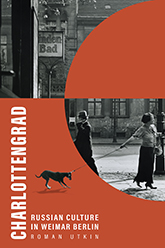|
Charlottengrad
Russian Culture in Weimar Berlin
Roman Utkin
“Illuminating. . . . [An] ambitious and wide-ranging study. . . . Utkin provides a fresh and multifaceted view of a diverse community that has hitherto been treated for the most part homogenously.”
—Times Literary Supplement
Between Weimar Berlin and Soviet Russia
As many as half a million Russians lived in Germany in the 1920s, most of them in Berlin, clustered in and around the Charlottenburg neighborhood to such a degree that it became known as “Charlottengrad.” Traditionally, the Russian émigré community has been understood as one of exiles aligned with Imperial Russia and hostile to the Bolshevik Revolution and the Soviet government that followed. However, Charlottengrad hosted a full range of personal and political positions vis-à-vis the Soviet project, from enthusiastic loyalty to questioning ambivalence and pessimistic alienation.
By closely examining the intellectual output of Charlottengrad, Roman Utkin explores how community members balanced their sense of Russianness with their position in a modern Western city charged with artistic, philosophical, and sexual freedom. He highlights how Russian authors abroad engaged with Weimar-era cultural energies while sustaining a distinctly Russian perspective on modernist expression, and follows queer Russian artists and writers who, with their German counterparts, charted a continuous evolution in political and cultural attitudes toward both the Weimar and Soviet states.
Utkin provides insight into the exile community in Berlin, which was one of the earliest to face and collectively process the peculiarly modern problem of statelessness. Charlottengrad analyzes the cultural praxis of “Russia Abroad” in a dynamic Berlin, investigating how these Russian émigrés and exiles navigated what it meant to be Russian when the Russia they knew no longer existed.
Roman Utkin is an associate professor of Russian, East European, and Eurasian studies at Wesleyan University.
Praise
“With its rich, independently interesting case studies, Utkin’s homage to the ‘colorful patchwork’ of émigré life displays the hidden complexity and disorder of Russian Berlin.”
—Modern Language Review
“A groundbreaking book—an innovative, compelling, and important contribution to the study of Russian and Russophone cultural life during the interwar era. This is a bold and necessary corrective to narratives concerning global Russian culture in the postrevolutionary period.”
—Kevin M. F. Platt, University of Pennsylvania
“Utkin digs deep into the world of Russian Berlin, a liminal site that allowed Russian artists displaced by the Bolshevik Revolution to begin to imagine what emigration might mean. He reminds us of the fluidity of the historical moment and the diverse choices Russian creators made. A unique and significant study.”
—Catherine Ciepiela, Amherst College
“Excellent. . . . A valuable book for historians and literary specialists, particularly for the ways that it geographically decenters postrevolutionary culture and unsettles political ideas about the disparity between revolutionary and reactionary thought.”
—The Russian Review
“[A] revealing portrait of this community. . . . Utkin demonstrates the meaningful engagement of Russians with the landscape of the city, and his highlighting of the hybridity and ambivalence of the Russian community makes it a welcome addition to the scholarships on Russia abroad and Weimar Berlin alike.”
—German Studies Review
“[A] thought-provoking study. . . . A fresh approach to diaspora studies.”
—Slavic and East European Journal
“A piece of rigorous cultural history. It pursues refreshing new meanings while applying traditional tools of literary and visual analysis to familiar texts and artefacts and covers new archival material. . . . [A] conceptually innovative project.”
—Slavonic and East European Review
Table of Contents
List of Illustrations
Acknowledgments
Note on Transliteration and Translation
Introduction
1. Unsentimental Journeys: Berlin as Trial Emigration
2. Guides to Berlin: Exiles, Émigrés, and the Left
3. Performing Exile: The Golden Cockerel at the Berlin State Opera
4. Nabokov, Berlin, and the Future of Russian Literature
5. Queering the Russian Diaspora
Conclusion
Appendix: The Russian Poets Club Meeting Minutes, Berlin, 1928
Notes
Bibliography
Index
|

Larger images
New in Paperback!
November 2024
LC: 2022049612 DD
292 pp. 6 x 9
22 b/w illus.
|

